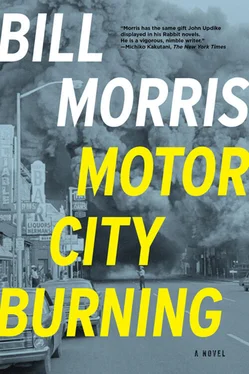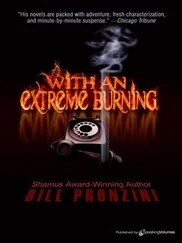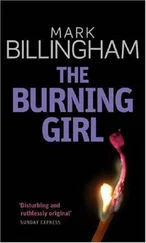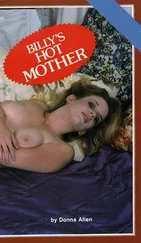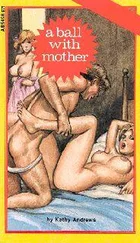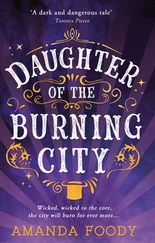“Hope you don’t mind the AC,” Bob said, fiddling with the controls.
“No, it’s fine. Feels good. Man, this thing rides smooth.”
“What’d you expect? It’s an Electra.”
There it was again. He called the car an Electra, the way a white man would. To all the brothers in Detroit, the 225 was a Deuce and a Quarter, or simply a Deuce, a term of great reverence, for this car was the pinnacle of status in the inner city, even higher than a Cadillac. Cadillacs were for preachers and pimps and the rich honkies out in Grosse Pointe and Bloomfield Hills. The Deuce and a Quarter was the hip Detroit ride.
“You need to get you one a these,” Bob said. “You still driving that old Buick?”
Willie took a deep breath and got ready to tell the lie for the first time. He thought of his mother’s sister, Aunt Nezzie, that great repository of mother wit, telling him years ago that if you’re going to lie you’d better have a good memory. He’d been rehearsing this lie ever since the Tigers’ game, when he stowed his Buick in the garage after hearing about Clyde Holland’s client getting taken downtown for questioning. That was Willie’s wake-up call, his return to a world of worry he thought he’d escaped. Now he could see that there would be no escape from that world until the murder was solved. And even that prospect merely tightened the bind he was in. He wanted to learn he was innocent, of course, but what about the unthinkable — what about learning he was not? So he wanted the cops to remain in the dark because as long as the case remained unsolved he could tell himself that he was innocent — and that his brother was innocent, too. Not knowing might be even better than knowing, but uncertainty was its own kind of purgatory, one he was not eager to re-enter. Yet he had no choice. So here he was, getting ready to tell the well-rehearsed lie for the first time. He glanced at his Uncle Bob and said, “Yes and no.”
“What’s that suppose to mean?”
“Means I can still drive it, but I’m afraid to. The transmission’s leaking like a faucet, so I parked it in the garage till I save up enough to get it fixed.”
“How much you pay for that thing?”
“Nothing. It was a gift.”
“No shit. From who?”
“A Navy buddy of my brother’s, a white guy named Sam Malloy. He and his long-legged blonde wife showed up at my place in Tuskegee in late ’63, right after President Kennedy got shot, and handed me the keys and the title.”
“Just like that?”
“Just like that. I couldn’t believe it either.” Five years later, Willie still couldn’t believe it. He’d spent his boyhood learning to make do with the second-hand and the second-rate — hand-me-down clothes and shoes from his brother, hand-me-down textbooks from the white schools, with all the important stuff already underlined, the covers falling off, entire pages missing. At the colored playground the basketball court was cracked and uneven, the rims bent and rusty, the balls smooth as cue balls. The baseball diamond was pocked, baked dirt with a few shoots of crab grass. He didn’t give these things a second thought, nobody did. And then, when he was a young man putting his body on the line to change the world he’d once accepted as a given, a friend of his brother’s drove up and gave him the most beautiful car he’d ever seen. Gave it to him. It was so miraculous it was almost an insult to the monastic life he was living at the time. But on that day Willie came to understand something that his fellow Snick foot soldiers, those austere warriors, never acknowledged or discussed — that there was another world out there, a world of shiny things that weren’t cracked or bent or used-up, and those things were within reach, even for a black man, and there wasn’t a damn thing wrong with wanting them. Willie loved that Buick shamelessly, and of course he pampered it.
Uncle Bob said, “So why’d this white dude give you a car?”
“He told me Wes saved his life on a patrol one night in Vietnam, and he wanted to repay the favor. So Wes told him to give me the car.”
“Well, get that tranny fixed and sell the thing and get you an Electra. All you gotta do is play your cards right.”
“My cards, Uncle Bob? What cards?”
“I been watching you. Your mother was right about you.”
“She’s your big sister. She’s always right.”
“Listen to me. You aren’t like the rest of the Negroes up here. You got a brain and you aren’t afraid to work. Plus, you’re articulate and you know how to talk to all kindsa people. Those things right there can take a man a long way up here. Even a black man.”
“Uncle Bob, I’ve got a year of college under my belt and I’m working as a busboy at a honky golf club in the suburbs of—”
“If you didn’t want to wind up bussing tables, then maybe you shoulda stayed in college like your daddy and I told you to.”
Willie should have known that was coming. His uncle, like his father, bought into the myth that something as flimsy as a college degree could actually make a difference in a black man’s life. On the other hand, Willie’s mother, the best educated person in the family, had urged him to listen to the voice in his head and drop out of Tuskegee and join the movement. And she’d never second-guessed him when it all fell apart. Ma BeBe was a rock.
Bob said, “Is there something wrong with bussing tables?”
“No, Uncle Bob. Not a goddam thing. I love it.”
“You’re saving money, aren’t you?”
“A little.” He wanted to add that he wasn’t saving it nearly as fast as he’d squandered it over the past year, but he was too ashamed to admit that to his uncle or anyone else.
“You aren’t working in no car factory or turpentine still or cotton patch, are you?”
“Hell no.”
Uncle Bob shifted in his seat, and Willie could feel it coming: The Lecture, The Black Bourgeoisie Pep Talk. He didn’t want to hear it again, and suddenly he was angry. Angry at his uncle for buying into all that up-by-the-bootstraps, Booker T. Washington horseshit. Angry at himself for getting painted into a corner and having to take the lowly busboy job. Angry at the white man for setting up the game so the black man’s only choices were between bad and worse, between wrong, wronger and wrongest. Yes, he was back in that familiar purgatory.
Before his uncle could launch into The Lecture, Willie cut him off. “You ever read Paul Laurence Dunbar by any chance?” Willie assumed he had, for as much as Uncle Bob was a driven man and a believer in the system, he was no black Babbitt. He’d put himself through night school at Wayne State and he still found time to read serious books, attend symphony concerts, visit the Institute of Arts. He was active in Detroit’s Democratic Party and had just been named a delegate to the upcoming convention in Chicago. Bob Brewer’s biggest worry was not that President Johnson’s Great Society was an expensive joke, but that by choosing not to seek re-election Johnson had ceded the White House to the Republicans. It had long ago stopped mattering to Willie which white man lived in the White House.
“Sure,” Bob said. “ Lyrics of a Lowly Life . All those stories in dialect.” Suddenly he slipped into a respectable darkie-on-the-plantation dialect: “‘An’ ez fur boss, I’ll be my own, I like to jest be let alone. .’ Dunbar was a man after my own heart.”
“And look at him,” Willie said. “Cat as gifted as that, wanted to go to Harvard Law School, wound up as an elevator operator in Dayton, Ohio, making four dollars a week. I think of a guy like Paul Laurence Dunbar and I ask myself what’s the use of dreaming?”
“You think he let that elevator job stop him from dreaming? And writing?”
Читать дальше
